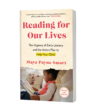Dear Maya,
How do you stop putting everyone else’s needs and happiness before your own, yet still be considered a caring person/mom?
“Selfish” in Seattle
Dear “Selfish” in Seattle,
I wish I had a magic solution for this one, but the truth is that there’s not much you can do to make sure that others consider you a caring person or mom. No matter how hard you work or how much you give, others may still judge you harshly any time your desires come into conflict with theirs. So you’re better off deciding for yourself what’s self care and what’s self absorption and then developing the confidence to shake off negative opinions. In my experience, most mothers (working or not) lean heavily into the over-guilt, under-self-care side of the equation.
Someone I care about called one of my decisions selfish, not long ago. The comment hurt, and I felt sad and angry. But ultimately, I decided that other people’s opinions (even loved ones’) don’t have much to do with me. I chose not to agree with the negative assessment of my motivations (I know my heart) and kept right on doing me. There’s something to be learned from listening to others’ assessments of our actions, but not much. The real wisdom comes from setting our own standards, receiving feedback, and then taking advice to heart only if it resonates with what we know to be true. You’ve got to learn to discern between guilt that’s coming from uncalled for external pressure and internal guilt that’s alerting you to an imbalance. Recognize if your children, spouse or other commitments are truly suffering.
Here are a few of my core beliefs that bolster my resolve to be myself and take care of me, despite occasional hateration. I hope they help you in learning to prioritize your needs and happiness.
Belief One: You make a real impact–in your family, workplace, community–when you take the time to discover your strengths, interests and priorities. Ease guilt by deciding upfront what you’re about and rejecting activities or invitations that don’t line up. It’s okay to be selective about how you spend your time. In fact, it’s irresponsible not to be.
Determine specific criteria in advance that you’ll use to decide if an activity, event or project is a great fit for you now. The clearer you are about what you’re here to do, the easier it is to opt out of things other people want you to do without guilt. Too often we feel bad about letting people down in the moment, when the graver problem is failing ourselves and our loved ones over the long haul.
Here are some selection criteria to use when evaluating how to spend your time.
- Would I deeply enjoy the people and the activity itself?
- Would my participation make a meaningful difference for me personally or to someone or something I care about?
- Do my skills, interests, energy, priorities and workstyle fit the opportunity?
- Can the activity be easily and inexpensively delegated to a capable third party?
There are countless great activities out there, but they aren’t all best for you nor you best for them. Take seriously the obligation to discern the precious few that are meant for you. Accepting unwanted invitations and obligations is a surefire way to bring negativity and resentfulness into your life. You’ll make a bigger impact and experience greater peace of mind when you do a few things with great love rather than many things with great fatigue and frustration.
Belief Two: Quality trumps quantity. Considerable me-time guilt is driven by social pressure to spend more and more in-depth time with children. But the pressure is unfounded. Most kids today don’t suffer from a lack of parental attention, compared to previous generations. Rather, time studies reveal, moms’ hands-on time with kids has actually increased dramatically since 1985. Working mothers today spend eleven hours a week caring for their children–the same amount that at-home mothers did in the ‘60s. And they spend 42 hours, half of their waking hours away from work, with their kids. At-home moms spend 64 hours. That’s plenty.
What’s more important than the quantity of time you spend with your kids, which is probably already there, is the quality. Find out which mommy time your children value most. Start simply, by just asking them. The Mom Complex CEO Katherine Wintsch periodically asks her kids, “What makes me a good mommy?” Her young daughter once replied, “You’re nice to me and you buy me pink clothes.” Wintsch thought, “I can do that all day long.”
The bottom line is: Let your kids’ unique perspectives and needs drive your activity, not the outside pressures of an unrealistic, unrelenting culture of hyperparenting. As Debora Spar observes in “Wonder Women: Sex, Power and the Quest for Perfection,” “Mothers today are literally draining themselves to entertain and educate their kids.”
It’s not a noble sacrifice, because the lost leisure, civic, spouse and sleep time can decrease the quality of interactions with your children. Extreme parenting isn’t a proven method for raising happy, well-adjusted kids.
Belief Three: Invoking the magic word “no” early and often creates the space to live your best life. “No” is a complete sentence, but it’s one that many of us aren’t bold enough to use in the face of unwanted invitations or “opportunities.” Having a couple of polite go-to lines at the ready can help you keep commitments in check. Here are my top picks:
- The Priority Statement: “No. I appreciate you thinking of me, but Little Sisters of the Poor is my priority.” (Sharing what you are committed to softens the blow of rejection. Who can compete with a charity, your children or whatever else you say you value? The asker has got to respect your dedication. If not, that’s more proof that you’re not the one for them.)
- The Referral: “No. I can’t take this on, but Susie Snowflake might be just the person you need.” (Only refer the asker to people you think would be genuinely interested in the opportunity, unless you are into making enemies and wasting people’s time.)
Start off with a clear “no” to avoid ambiguity. Some rejections are stated so mildly that they just come across as an invitation to ask you the same thing again at a later date. The goal is to refuse, not defer, unwanted invitations.
This really works. I used this method recently and listed several things that were higher on my list than the proposed activity (my daughter, my work, three volunteer commitments) and I received this response: “I hear you. That, I must say, was about the most eloquent and smooth ‘no thank you’ that I’ve ever received. I need to do more of that…it’s a constant struggle for me.”
Remember, say “no” politely, but firmly. And, above all, remember what you’re saying “yes” to–your dreams, your rest, your peace of mind.
Maya
P.S. Finally, cut out what I like to call The Other Busy Work. That is, the time we waste beating ourselves up about our decisions. If you want to spend more time working out or sitting alone twiddling your thumbs, so be it. Make the call and own the decision. Be unapologetic. Be happy with the choices and trade-offs you’ve made.


